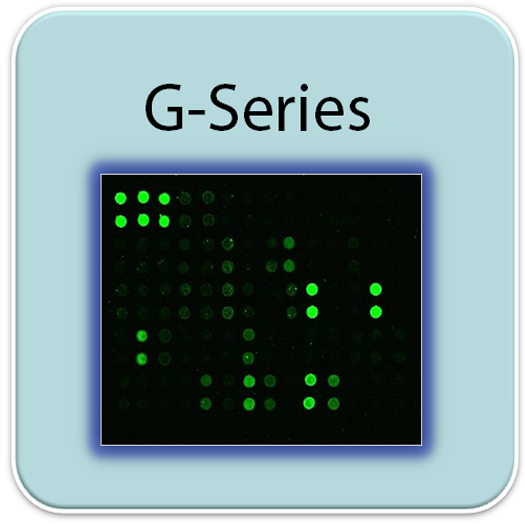RayBio® G-Series Mouse Cytokine Antibody Array 4 Kit. Detects 34 Mouse Cytokines. Suitable for all liquid sample types.
Product Description
Specifications
| Size | 4 Sample Kit, 8 Sample Kit |
|---|---|
| Species | Mouse |
| Quantitative/Semi-Quantitative | Semi-Quantitative |
| Number of Targets Detected | 34 |
| Compatible Sample Types | Cell Culture Supernatants, Plasma, Serum, Tissue Lysates, Cell Lysates |
| Solid Support | Glass Slide |
| Method Of Detection | Fluorescence Laser Scanner |
| Design Principle | Sandwich-based |
| Shipping Type | Blue ice |
| Storage / Stability |
|
| More Information | Suggested Application Multiplexed Protein Detection; Detection of Relative Protein Expression; Detecting Patterns of Cytokine Expression; Biomarker Screening; Identifying Key Factors; Confirming a Biological Process |

Amazon Gift Cards!
$5 Amazon gift card in every kit box purchased.
| Scroll over each target protein for more information | ||||
|---|---|---|---|---|
bFGF
| CD26 (DPPIV)
| Dtk
| E-Selectin
| Fc gamma RIIB (CD32b)
|
Flt-3 Ligand
| GITR (TNFRSF18)
| HGFR
| ICAM-1 (CD54)
| IGFBP-2
|
IGF-1
| IGF-2
| IL-15
| IL-17 RB
| IL-7
|
I-TAC (CXCL11)
| Lungkine (CXCL15)
| MDC (CCL22)
| MMP-2
| MMP-3
|
Osteopontin (SPP1)
| Osteoprotegerin (TNFRSF11B)
| Pro-MMP-9
| Resistin
| Sonic Hedgehog N-Terminal (Shh-N)
|
TCK-1 (CXCL7)
| TIMP-2
| TRANCE (TNFSF11)
| TROY (TNFRSF19)
| TSLP
|
VEGFR1
| VEGFR2
| VEGFR3
| ||
Application Notes
Suggested Application
Multiplexed Protein Detection; Detection of Relative Protein Expression; Detecting Patterns of Cytokine Expression; Biomarker Screening; Identifying Key Factors; Confirming a Biological Process
Kit Components
- Mouse Cytokine Antibody Array G4 Slide(s)
- Blocking Buffer
- Wash Buffer 1
- Wash Buffer 2
- Biotinylated Detection Antibody Cocktail
- Streptavidin-Conjugated Fluor
- Lysis Buffer
- Adhesive Plastic Strips
- 30 ml Centrifuge Tube
- Manual
Other Materials Required
- Small plastic boxes or containers
- Pipettors, pipette tips and other common lab consumables
- Orbital shaker or oscillating rocker
- Aluminum foil
- Gene microarray scanner or similar laser fluorescence scanner
View Compatible Laser Scanners
Don't have a compatible scanner? RayBiotech now offers FREE scanning service for all RayBio glass slide antibody arrays! Learn More
Protocol Outline
- Dry the glass slide
- Block array surface
- Incubate with Sample
- Incubate with Biotinylated Detection Antibody Cocktail
- Incubate with Streptavidin-Conjugated Fluor
- Disassemble the glass slide
- Scan with a gene microarray laser scanner
- Perform densitometry and analysis
Storage/Stability
For best results, store the entire kit frozen at -20°C upon arrival. Stored frozen, the kit will be stable for at least 6 months which is the duration of the product warranty period. Once thawed, store array slide(s) and 1X Blocking Buffer at -20°C and all other reagents undiluted at 4°C for no more than 3 months.
Panaroni C., Fulzele K., Saini V., et al. PTH Signaling in Osteoprogenitors Is Essential for B-Lymphocyte Differentiation and Mobilization. J Bone Miner Res. 2015 Dec;30(12):2273-86. doi: 10.1002/jbmr.2581.
Species:
Mouse
Sample Type:
Bone Marrow Aspirate (Mone marrow supernates from control and Osx-PPR KO mice)
Udagawa, Takeshi, et al. "Vascular Endothelial Growth Factor-D-Mediated Blockade of Regulatory T Cells within Tumors Is Induced by Hematopoietic Stem Cell Transplantation." The Journal of Immunology 191.6 (2013): 3440-3452.
Species:
Mouse
Sample Type:
Tissue Lysate (tumor lysate)
Liu ML., Nagai T., Tokunaga M., et al. Anti-inflammatory peptides from cardiac progenitors ameliorate dysfunction after myocardial infarction. J Am Heart Assoc. 2014 Dec 2;3(6):e001101. doi: 10.1161/JAHA.114.001101
Species:
Mouse
Sample Type:
Conditioned Media (Cardiac progenitor cells, Skeletal myobalstas, and adipose-derived mesenchymal cells)
Koszalka P., Golunska M., Stanislawowski M., et al. CD73 on B16F10 melanoma cells in CD73-deficient mice promotes tumor growth, angiogenesis, neovascularization, macrophage infiltration and metastasis. Int J Biochem Cell Biol. 2015 Dec;69:1-10. doi: 10.1016/j.biocel.2015.10.003.
Species:
Mouse
Sample Type:
Tissue Lysate (B16F10 melanoma model)
Ionescu L, Byrne RN, van Haaften T, et al. Stem cell conditioned medium improves acute lung injury in mice: in vivo evidence for stem cell paracrine action. American Journal of Physiology - Lung Cellular and Molecular Physiology. 2012;303(11):L967-L977. doi:10.1152/ajplung.00144.2011.
Species:
Mouse
Sample Type:
Conditioned Media (Mesenchymal Stem Cell and Fibroblast media)
Litvinov D., et al. Anti-atherosclerotic actions of azelaic acid, an end product of linoleic acid peroxidation, in mice. Atherosclerosis. 2010 Apr;209(2):449-54. doi: 10.1016/j.atherosclerosis.2009.09.076.
Species:
Mouse
Benelli R., et al. Impact of CXCL1 overexpression on growth and invasion of prostate cancer cell. Prostate. 2013 Jun;73(9):941-51. doi: 10.1002/pros.22640.
Species:
Mouse
Sample Type:
Tissue Lysate (TRAMP-G2 tumors, TRAMP-G2LG tumors, and corresponding cell lines)
Miyauchi S., et al. Oral infection with Porphyromonas gingivalis and systemic cytokine profile in C57BL/6.KOR-ApoEshl mice. J Periodontal Res. 2012 Jun;47(3):402-8. doi: 10.1111/j.1600-0765.2011.01441.x
Species:
Mouse
Miyauchi S., Maekawa T., Aoki Y., et al. Oral infection with Porphyromonas gingivalis and systemic cytokine profile in C57BL/6.KOR-ApoE shl mice. J Periodontal Res. 2012 Jun;47(3):402-8. doi: 10.1111/j.1600-0765.2011.01441.x.
Species:
Mouse
Sample Type:
Serum (oral infectioni with Porphyromonas gingivalis and systemic cytokine profiling)
Labelle M., et al. Platelets guide the formation of early metastatic niches. PNAS published online July 2014. www.pnas.org/cgi/doi/10.1073/pnas.1411082111
Species:
Mouse
Sample Type:
Conditioned Media (platelet releasates)
Write Your Own Review
